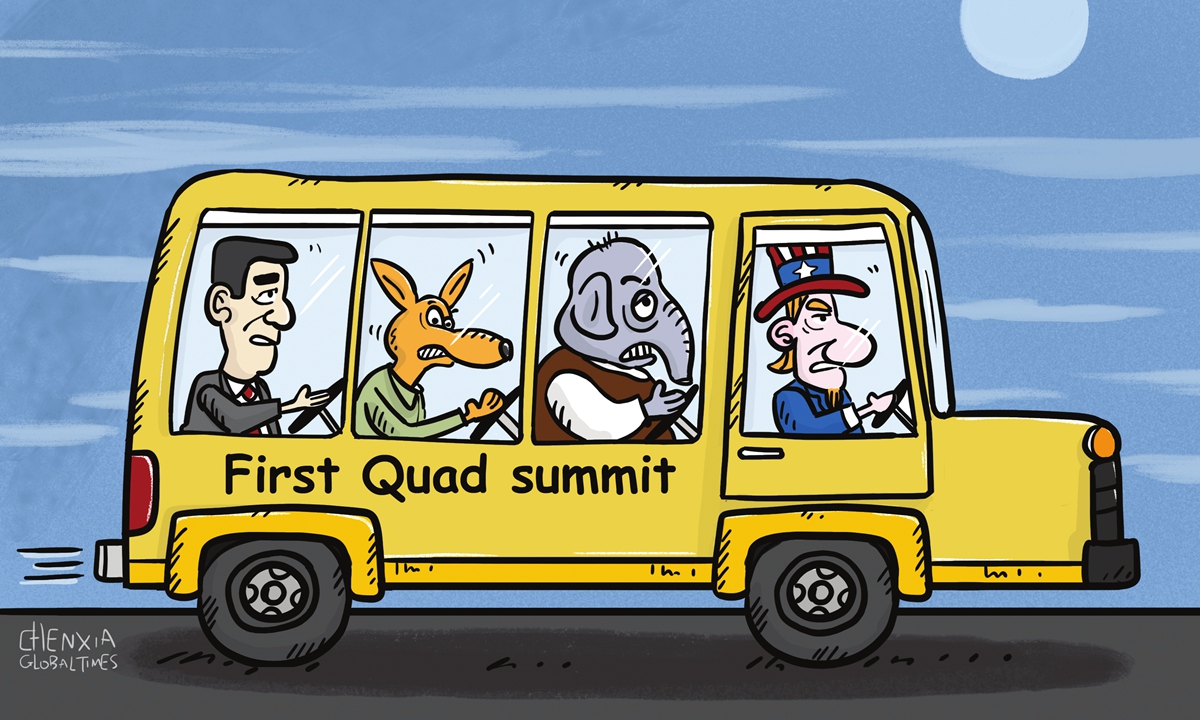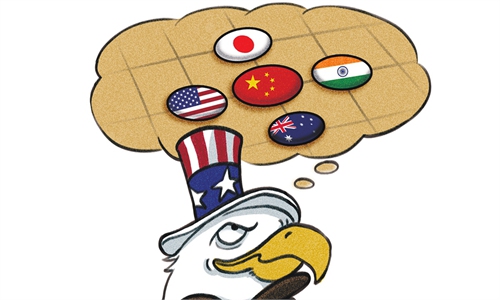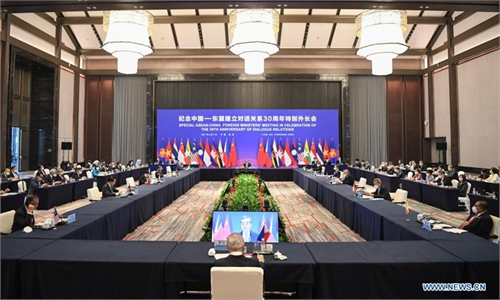
Illustration: Chen Xia/GT
According to Kyodo News, the Biden administration has proposed to Japan, Australia and India that the first in-person "Quad" meeting of the countries' leaders be held in Washington in late September.
If the proposal is implemented, it will be the first time that leaders of the four democratic powers in the Indo-Pacific region meet face-to-face to discuss how to jointly deal with the "China challenge."
"The gathering would underscore the unity among the four Indo-Pacific democracies amid China's growing assertiveness," Kyodo News noted.
If the first face-to-face Quad summit takes place, it will be symbolic, meaning a quartet mechanism is formed. In this way, the US is trying to form a confrontational structure in the Indo-Pacific region to strategically contain and exert pressure on China. In the Quad mechanism, the US and Japan are the axis. Australia is the accomplice. India is the coordinator. All four countries want to address the perceived pressures and challenges posed by China's rise. Washington wants to take the lead in institutionalizing the Quad. China will undoubtedly become the focus of this proposed summit.
Earlier, leaders of the four countries held the first-ever leader-level summit of the Quad online on March 12, reaching agreement on cooperation in the production and supply of COVID-19 vaccines. They also reached consensus on the creation of the resilient supply chains for materials such as rare-earth. However, it turns out that these consensuses have not been implemented very much. The consensus from the March online summit only provided vague direction. The four countries are likely to have concrete and practical discussions at the offline summit.
The meeting is expected to discuss efforts to expand coronavirus vaccine production and possible cooperation on infrastructure projects, the report said. Cooperation among the four countries on vaccine production and infrastructure may pose some challenges to China, but it is unable to contain China in relevant areas.
The four countries are attempting to establish a vaccine community to limit China's influence. But many countries have complained about US vaccine nationalism and hoarding. In terms of infrastructure, India is in a significant position for the China-proposed "Belt and Road" Initiative (BRI). Therefore, the US wants to use India to hinder the development of the BRI. Its aim is to tear Asia apart and strengthen its own dominance in the Indo-Pacific region. But China's potential is huge. China has its own strategic confidence. The US and other Quad countries can hardly achieve their goals.
Now the Japanese government has made a clear choice: It has taken a side with Washington. This approach poses a great challenge to Japan, whose strategic choice has formed a serious contradiction with reality. Tokyo wants to follow Washington's lead in suppressing Beijing. But in fact, Japan's economy cannot develop in isolation from China.
The four Quad countries all regard China as a rival. But they are not in complete agreement on actual practices and their respective national interests. The US' goal is to completely suppress China. For Japan, however, its economic dependence on China has led to a split in its strategy. Australia shares the US strategy in terms of culture and values, but also has a need for China in terms of economics and regional cooperation. India is trying to improve its international status with the help of the US. But New Delhi is not strong enough and can't get the comprehensive help from Washington — so it also needs to cooperate with China economically.
On the one hand, the four countries are in political and security confrontation with China, and on the other hand, they are unable to decouple from China economically. This will lead to their own strategic contradictions. If Washington tries to use China as a focal point to promote Quad mechanisms, its wishes will not be fulfilled easily.
The author is founding director of the Center for Strategic and Peace Studies at the China Foreign Affairs University. opinion@globaltimes.com.cn



